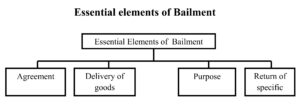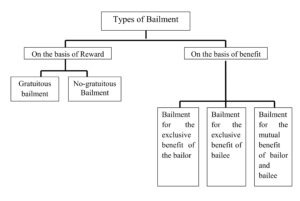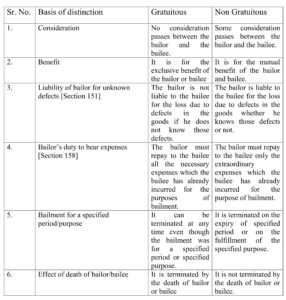Kinds of Guarantee
- Specific or Simple Guarantee: When a guarantee is given in respect to a single debt or specific transaction is to come to an end when the guarantee debt is paid or the promise is duly performed. It is called a specific or simple guarantee.
- Continuing guarantee: Section 129, of the contract Act defines a guarantee which towards to a series of transaction, is called a continuing guarantee, thus, a continuing guarantee is not confined to a single transaction but keeps on moving to several transaction continuously.
Revocation of Guarantee
Revocation of guarantee means cancellation of guarantee already accrued, it may be noted that the specific guarantee cannot be revoked if the liability has already secured. However a continuing guarantee can be revoked and on the revocation of such a guarantee. The liability of the surely or guarantor comes to an end for the future transaction. The surety continues to be liable for the transactions which have taken place up to the time of revocation. A continuing guarantee may be revoked in any of the following waysA Guarantee may be revoked in any of the following ways-
- By notice of revocation.
- By death of surely.
- By discharge of surely in various circumstances
- By novation (Sec.62)
- By variance in terms (Sec. 133)
- By release/discharge of principal Debtor (Sec.-134)
- When the creditor events in to an agreement with the principal debtors (Sec.13..)
- By creditor act or omission impairing surety’s eventual remedy (Sec. 139)
- By loss of security “(Sec. 141)
- By invalidation of contract (Sec.142,143,144)
Bailment
Bailment the world ‘bailment’ is derived from the French world the French world ‘baillier’ which means ‘to deliver Etymologically, it means any kind of handling over’. In legal sense, it involves change of possession of goods from one person to another for some specific purpose.
Definition of Bailment
Sec. 148 defines Bailment as” the delivery of goods by one person to another for some purpose, upon a contract, that they shall, when the purpose is accomplished, be returned or otherwise disposed of according to the directions of the person delivering them”. The person delivering the goods is called the ‘bailor’ and the person the person to whom they are delivered is called the ‘bailee’.
Consideration in a contract of bailment
In a contract of bailment, the consideration is generally in the form money payment either by the bailor or the bailee, as for example, when A gives his bicycle to B for repair, or when A gives his car to B on hire. Such consideration in money form, however, is not necessary to support the promise on the part of the bailee to return to goods. The detrainment suffered by the bailor, in parting with possession of the goods, is a sufficient consideration to support the contract of bailment.
1. Agreement
There must be an agreement between the bailor and the bailee.This agreement may be either express or implied.However,a bailment may be implied by law also. For example,bailment between a finder of goods and owner of goods.
2. Delivery of Goods
There must be delivery of goods.It means that the possession of goods must be transferred.In this this connection,The following points may be noted:
i. The delivery must be voluntary,for example the delivery of jewellery by its owner to a thief who shows a revolver,does not create a bailment because the delivery is not voluntary.
ii. Delivery may be actual or constructive.
3. Purpose
The delivery of goods must be for some intented purpose.For example,wrong delivery of goods to Jaipur Golden Roadways instead of Patel Roadways,does not create any bailment.
4. Return of specific Goods
The goods which form the subject matter of a bailment must be returned to the bailor or otherwise disposed off according to the directions of the bailor,after the accomplishment of purpose or after the expiry of period of the bailment.it may be noted that the same goods must be returned in their original form or desired.
Kinds/types of Bailment
i. On the basis of reward
a) Gratuitous Bailment
It is a contract of bailment where no consideration passes between the bailor and the bailee.
b) Non-gratuitous Bailment
It is a contract of bailment where some consideration passes between the bailor and the bailee.
Difference between Gratuitous bailment and non-gratuitous bailment
ii. On the basis of Benefit
a) Bailment for the exclusive benefit of the bailor
It is a contract of bailment which is executed only for the benefit of the bailor and the bailee does not derive any benefit from it.
b) Bailment for the exclusive benefit of the bailee
It is a contract of bailment which is executed only for the benefit of the bailee and the bailor does not derive any benefit from it.
c) Bailment for the mutual benefit
It is a contract of bailment which is executed for the mutual benefit of bailor and bailee.





Nice notes
Amazing notes, covering almost all points of the topics.
Some points may be further added:-
DEFINITION OF INDEMNITY AS PER ENGLISH LAW
INDEMNITY AND INSURANCE
CLAIM OF LOSS BEFORE PAYMENT
– Usman Jamal vs. Gopal Purushottam, 1928 ILR, Kolkata
METHOD OF CREATING INDEMNITY OBLIGATIONS
SITUATIONS OF TYPES OF INDEMNITY CREATION
LIABILITY OF INDEMNIFIER
COMMENCEMENT OF LIABILITY OF INDEMNIFIER
DOCUMENTS AGREEMENTS OF INDEMNITY
LIABILITY OF SURETY
RIGHTS OF SURETY
POSITION OF MINOR
LETTER OF CREDIT OR BANK GUARANTEE
SURETY AS FAVOURED DEBTOR
Brikmyr vs. Darnell
CONTINUING GUARANTEE – Durga Priya Choudhary vs. Durga Pada
EXTENT OF SURETY’S LIABILITY S.128
FINDER OF GOODS AS BAILEE
ACTUAL DELIVERY AND CONSTRUCTIVE DELIVERY (Fazal vs. Salamat Rai)
RIGHT TO DISPOSE OF THE GOODS
BAILMENT AND HIRE PURCHASE
PLEDGE BY CERTAIN SPECIFIED PERSONS MENTIONED IN THE INDIAN CONTRACT ACT
KINDS OF AGENTS AND AGENCIES
DISTINGUISHEMENT BETWEEN AGENT AND SERVANT
LIABILITY OF PRINCIPAL FOR AGENT’S MISCONDUCT AND TORT
LIABILITY OF PRINCIPAL AND AGENT BEFORE AND AFTER TERMINATION
*Over all the notes are superb…….!!!
hi
I really appreciate you taking the time to comment…Suggestions and new ideas are always welcome. I’ll try to add these points to this topic.
Thanks for being optimist 🙂
This is so amazing notes helps to know the whole objects ina topic good work??✋?
Thanks 🙂
Thanks… nice notes…
Really it is very useful….Tq so much?
It is in point of fact a great and helpful piece of information. I am glad that you just shared this useful information with us. Please keep us up to date like this. Thanks for sharing.
Thank you so much this is a best not it’s helpful for my exam
I gotta favorite this website it seems handy extremely helpful
Keep up the good work! Thanks.
I truly wanted to write a brief note so as to say thanks to you for the stunning secrets you are sharing here. My extensive internet investigation has at the end of the day been paid with pleasant suggestions to share with my friends and family. I would repeat that we readers actually are unequivocally blessed to live in a very good network with many brilliant individuals with very helpful techniques. I feel somewhat grateful to have encountered your entire webpages and look forward to some more pleasurable minutes reading here. Thank you once more for everything.
Appreciate it for this grand post, I am glad I observed this site on yahoo.